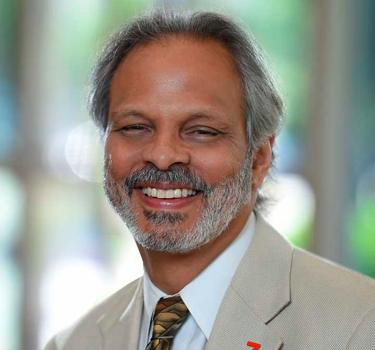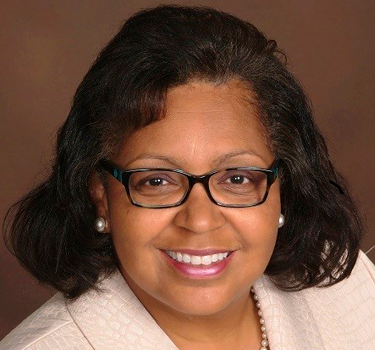The Robert Wood Johnson Foundation (RWJF) noted in a recent report that building a national culture of health will take "collective engagement and unprecedented coordination between the public and private sectors."
Amgen is an advocate of this approach, especially for tackling the biggest and most complex health challenges facing patients and societies around the world. That is why we both support independently led initiatives and forge strategic collaborations with other organizations.
There is no better time than American Heart Month to hear from experts at organizations that Amgen supports and works with about how collaborations are making a difference in improving heart health of the communities they serve.
Joining us for this conversation are:

Dr. Michelle Albert
President
Association of Black Cardiologists

Dr. Eduardo Sanchez
Chief Medical Officer for Prevention
American Heart Association

Dr. Lisa Waddell
Chief Medical Officer
CDC Foundation

Katherine Wilemon
Founder and Chief Executive Officer
Family Heart Foundation
Why are collaborations important in addressing major public and population health challenges, particularly cardiovascular disease, in the communities you serve?
Dr. Waddell: Public health professionals have been fighting cardiovascular disease for a long time, making tangible progress along the way. But we are seeing some concerning plateaus and even some declines in that progress. According to the CDC, nearly half of Black men and women in the United States are living with some form of cardiovascular disease. Collaboration is more important than ever because by working together we can create innovative strategies to engage individuals and communities in ways that will drive meaningful action.
Dr. Sanchez: Too many organizations are working in isolation from one another. Building more powerful public-private healthcare partnerships is vital to moving the needle in addressing public and population health challenges. The American Heart Association works with several community organizations, individual ambassadors, and strategic alliances to harness innovation, disrupt the status quo, and effect system change to ensure equitable health for all.
Dr. Albert: Local and industry collaborations, like the one between the Association of Black Cardiologists and Amgen, are essential to our ability to plan and implement our innovative models of health education. They are also key to our ability to evaluate their success in increasing awareness of cardiovascular-related diseases and their prevention for the populations in the diverse communities we serve.
Ms. Wilemon: Effective structural and personal solutions to pervasive healthcare challenges, like managing and preventing heart disease, require that everyone do their part. Solutions must work at many levels and for diverse groups. Multi-stakeholder collaborations are our best way to find the strongest solutions.
Tell us about the focus and goals of your organization's heart health campaign.
Dr. Sanchez: Only 20% of a person's health is shaped by access to quality health care, but where a person lives could cost them up to two decades of life. The American Heart Association is working to support community transformation through educational outreach. Our vision is to meet people where they are and empower them to take action. Our EmPOWERED to Serve health lessons engage and support local community members to create a culture of health.
Dr. Albert: At the heart of the Association of Black Cardiologists is our unwavering commitment to improving cardiovascular health outcomes in the most underserved and disproportionally impacted communities. Our Spirit of the Heart initiative encourages community-wide participation at every level of our heart disease and stroke education, detection and prevention efforts. Spirit of the Heart helps community members understand that heart disease is preventable, and heart healthy practices are important for longevity and quality of life.
Ms. Wilemon: The vast majority of people who have a genetic driver of their cardiovascular risk have not been diagnosed and therefore are not getting the care they need. For the Family Heart Foundation those are people with the genetic disorders Familial Hypercholesterolemia (FH) and/or elevated Lipoprotein(a), many of whom are already living with heart disease. Our More Families, More Hearts campaign connects the dots between cardiovascular disease and high cholesterol that "runs in the family" and how to get an actual diagnosis and appropriate, timely management. What is particularly important about this campaign is that we will identify entire families and be able to help them with tools to address this genetic risk and prevent cardiovascular disease.
Dr. Waddell: Live to the Beat, which is part of the CDC Foundation's Alliance for the Million Hearts® Campaign, focuses on helping people understand their personal risk for heart disease and stroke, believe in their power to change it and take steps that lower their risks. At its core, this is a belief change campaign. We have seen great progress with prior campaigns that have similar goals. Live to the Beat builds on that progress – inspiring Black adults who have cardiovascular disease risk factors, in particular, to positively believe they can be successful and to have confidence in their ability to overcome their barriers to heart-healthy living.
Your initiatives are very interactive, encouraging both communities and individuals to take actions toward better heart health. Can you talk about what makes your approach unique?
Dr. Albert: Spirit of the Heart is anchored by a three-part strategy to engage the community at all levels. Our Community Leaders' Forum engages civic, religious, nonprofit, grassroots advocacy, education and healthcare leaders to discuss the cardiovascular health of the local community. Together, they identify risk reduction strategies and commit to a "call to action" to improve community health, including ensuring equal access to care and resources for all. Our Message from the Pulpit program works with local faith-based leadership to provide congregational messages based on the ABC's "7 Steps to a Healthy Heart" which was first introduced by the organization in 2001. Lastly, we hold community-wide health fairs where ABC-trained health advocates and local partners provide free health screenings to assess heart disease and stroke risk factors.
Ms. Wilemon: Over our first 10 years, we built easy to understand educational tools and easy to access support resources to help people navigate their journey. It is stressful to need a surgery or to discover that your child has inherited a genetic condition from you. Our Care Navigation Center helps people as they discover their diagnosis, connecting them with a specialist, providing resources to understand their treatment goals and options, and helping them to navigate access to care. We also help people inform their family members of the need to be screened and connect those who reach out to us with a knowledgeable and welcoming community of people who share their experience, including our volunteer peer support network. The More Families, More Hearts Campaign leads people to the resources they need at a time when our healthcare system places more and more responsibility on patients to navigate their own care. We help make sure they don't have to do that alone.
Dr. Waddell: Live to the Beat reflects a unique approach in cardiovascular disease communication campaigns. The key is that we included the perspectives of Black audiences, via focus groups, surveys and research, in creating our resources. The campaign's messages reflect what we heard, featuring: (1) strong empathy tones – acknowledging that the behaviors we're promoting aren't always easy and it's ok if it takes you some time to build new habits; (2) focus on living – emphasizing how cardiovascular disease prevention can improve your living and your quality of life rather than leading with the statistics about your chance of dying; and (3) emphasis on small steps – providing small step examples and solutions to reinforce that prevention is doable, one step at a time.
Dr. Sanchez: EmPOWERED to Serve is inspired by American Heart Association volunteers around the country who are passionate about driving change through health justice and community empowerment. Communities need the localized solutions and resources EmPOWERED to Serve provides to help individuals and families achieve longer, healthier lives. The community knows best which changes are needed to achieve best health for all. We amplify these community-centered solutions to make measurable impact on eliminating health disparities and moving toward health equity through improvement of social determinants of health.
Collaboration fosters bold solutions to improve public, community and individual health
Amgen is proud to work with the American Heart Association, Association of Black Cardiologists, CDC Foundation and the Family Heart Foundation and thanks the visionary leaders who took the time to talk about their work to improve patient outcomes and well-being.





